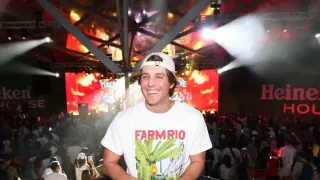January 31, 2016
SF Dyke March Needs New Organizers
Liz Highleyman READ TIME: 4 MIN.
More than 40 women gathered recently to discuss the future of the Dyke March after a year of controversy and attrition of organizers.
The remaining Dyke March committee members who called the January 21 meeting at the Mission Cultural Center for Latino Arts - Russel Arelis, Liz Combs, Rosa Hernandez, and chair Elizabeth Lanyon - emphasized that they are stretched to their limits and the march might not happen this year unless more organizers step forward.
"This year we're left with four people who are unwilling to commit unless there's more help," said Arelis. "We would love to have 20 members."
The 2015 march was organized by just six women, with fewer than 10 volunteers on the day of the event.
"When there's less [organizers], a lot of things get left out - we're basically left with just organizing porta-potties and security," Hernandez added.
Controversy in 2015
The committee members discussed the issues surrounding last year's Dyke March - which saw thousands of women break away from the main march and cross police lines to follow the traditional route - but stressed that they wanted to focus on moving forward.
The march, which started in 1993 and now draws some 50,000 participants, has in recent years concluded around sunset as marchers joined the pre-Pride Pink Saturday street party on Market Street leading into the Castro.
In 2015 the Sisters of Perpetual Indulgence withdrew their sponsorship of Pink Saturday due to concerns about violence. In March the San Francisco LGBT Community Center took over the event, renamed Pink Party, and scheduled it earlier in the afternoon.
The Dyke March also had to deal with uncertainty about the status of Dolores Park. Not knowing whether renovations to the north end of the park would be completed in time or whether the city would allow a stage on the new lawn, the committee planned a street party at the intersection of Dolores and 18th streets with a sound truck serving as a stage.
Concerned about the safety of turning the truck around in a thick crowd, the organizers decided to change the route to go east on 17th rather than 18th Street. This minor change was historically significant, as it meant the march would no longer pass the Women's Building, the former site of the lesbian bar Amelia's (now the Elbo Room), or Good Vibrations.
Coming soon after the closure of the Lexington Club - the city's only dedicated dyke bar - the route change became a stand-in for the affordable housing crisis and wave of displacement plaguing San Francisco's queer communities.
"Queer women have been watching our friends and community members be displaced from the city at an alarming rate, and the reroute of the march away from some of our last standing lesbian community institutions really hit a nerve with a lot of people," breakaway march organizer Adele Carpenter told the Bay Area Reporter last year.
Backlash Not Anticipated
While many participants described the alternative march as empowering, others felt it split the community and showed a lack of support for the organizers.
After last year's march Lanyon told the B.A.R. that the organizers "did not anticipate the backlash from doing things differently for one year," but acknowledged in hindsight that they could have done more outreach to the community.
Hernandez echoed the same point at last week's meeting.
"Our concern has always been safety - we feel the responsibility for 60,000 bodies out there," she emphasized. "We realized the communication wasn't there, but we were underwater."
Hernandez also recalled that for many years the Dyke March never got permits and the route would change from year to year because they did not want the police to know where it was going.
The breakaway march was "an incredible display of community coming together, but also really tough," Lanyon said. "It felt like after so much work, members of our own community were upset. People started rumors that were not true and threw all sorts of shit our way that we had to address. But it was also really amazing because there was a real show of support and care for that march ... we want that same level of care commitment for the Dyke March."
"It was never meant to be divisive of the community," replied meeting attendee Joey "Cupcake" Stevenson, who spearheaded organizing of the breakaway march. "Hopefully we can take that energy that's still here and move it into keeping the Dyke March happening."
Moving Forward for 2016
Meeting participants then discussed planning for this year's Dyke March, which will take place Saturday, June 25.
Although Dolores Park renovations are now complete, the San Francisco Recreation and Park Department has indicated that it will no longer allow a stage to be set up in the park.
Plans for the annual Pink Party are still up in the air, the organizers said, but it will likely start and end early again this year. While some suggested that the Dyke March could end somewhere other than the Castro, others felt it was important that women not get pushed out of that historically queer space.
Regarding the major needs for the march, the organizers listed volunteer recruitment and training (especially for security), fundraising, accessibility and accommodations for elders and people with disabilities, social media outreach, coordinating vendors, renting a truck and equipment, and developing a program and lining up entertainers.
Lanyon said Dyke March committee members are expected to attend one two-hour meeting per month, with subcommittee meetings, phone calls, and other work in between - but the more people who are involved the less time it will require. A former committee member suggested that 20 people contributing 10 hours a month could get a lot done.
The next organizing meeting is set for Thursday, February 4, at a location to be announced. The agenda will include going through a list of all tasks that need to be done and forming subcommittees.
Hernandez concluded by saying she was excited by the energy and momentum of the meeting, and attendees echoed her sense of optimism.
"We're all here because we don't accept that the Dyke March won't continue," said Mission resident Kearstin Krehbiel.






